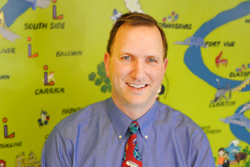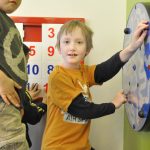
Why are so many parents talking up Dr. Todd Wolynn?
Why are so many parents talking up Dr. Todd Wolynn?
Kids+ Pediatrics Offices
Sitting in The Well — the classroom and community-outreach facility he opened next to his Kids+ Pediatrics — Dr. Todd Wolynn wears the practice motto, “Meet, Learn, Grow,” on a button on his shirt. “This is our mission statement: really meeting families where they’re at,” Wolynn says, “really learning what makes the children special, so it’s not cookie cutter medicine here.”
The Squirrel Hill waiting room of Kids+ is decorated with a mural depicting the city and rivers. Above that, interviews about health topics with Kids+ physicians play on the monitor as part of Touchtown, a local venture for which Wolynn is chief medical advisor. The practice’s Twitter feed runs along the bottom.
Breastfeeding Center of Pittsburgh
Attached to Kids+ is the Breastfeeding Center of Pittsburgh, for which Wolynn serves as executive director. He is one of seven board-certified lactation consultants at Kids+.
“The whole practice was built on teaching,” Wolynn says, pointing to founders Harvey Rubin and Gopal Pai, who were Mercy Hospital teachers. Wolynn was the first resident brought on, 17 years ago. Now Kids+ has a Pleasant Hills office and is poised to open their Cranberry office by the end of 2012.
Kids+ has more than 2,200 Facebook friends in more than 20 countries. Wolynn lectures nationally to the American Academy of Pediatrics (AAP) and hospitals about communicating with patients through social media.
“Generation Y are the generation having kids right now, and they don’t look up from their phones when you examine their kids,” he says. “If you don’t live there, how real are you to them?” On the Kids+ Facebook page, “you have parents asking questions, us answering them, and other parents jumping in.”
Physicians using social media “is really the wave of the future,” says Jill Stoller, M.D, chairperson of AAP’s Section on Administration and Practice Management; Wolynn serves on the Section’s executive committee. Wolynn’s practice is one of the only practices she knows that employs a director of communications. “I’m sure he’s right — it pays for itself several times over. And a lot of pediatricians have learned from him and are modeling themselves after what he does for their own practices.”
As important as the Breastfeeding Center is medically, it is also an innovative part of Wolynn’s business model. “He’s really taken it to a different level,” Stoller says. “He’s learned how to make that a financially viable part of a physician’s practice.”
In his AAP work, “I get to see what is innovative and cool,” Wolynn says. “But I see we’re at the forefront of what is going on across the nation.”
That includes having morning and evening hours when families can just walk in, provided their child is not too young or having serious symptoms. An online patient portal allows families to access patient charts, print immunization records, request prescription refills and schedule well visits.
Wolynn, who has a 10-year-old daughter and twin 8-year-old boys, realizes that his practice competes for patient oversight with 24-hour services such as drugstore clinics and urgi-care offices, so Kids+ is open seven days a week, including four evenings. The secret to effective care, he says, “is just listening. Honestly, my favorite thing is growing with the kids. I find out about their pets, their favorite sport, what they want to be when they grow up. I write it down on their charts.”
Trying new services in his practice “is kind of like imaginative play,” he says. His partner, Albert Wolf, M.D., is getting his MBA, and Wolynn earned his Master in Medical Management degree from Carnegie Mellon University, so they can make sure the practice stays viable, and grows. “We’re independent, so nobody owns us. We view the practice as a living lab. If you can think it up, and it helps patients, and it makes business sense, we’re going to try it.
“It’s just fun,” he says of running his practice. “My stepdad said, ‘Like what you do.’ I’m just excited, waking up every day.”
Waking, and sleeping, are just some of the pediatric issues Wolynn focuses on at Kids+.
“If you ask parents and families what their most concerning issues are for kids growing up, they’re eating and sleeping,” he says. “A child that’s not sleeping will cause all sorts of issues for the child and his family.”
Today’s parents may not have grandparents or other extended family close by to teach them how to deal with such basic infant issues. Wolynn started a “help bible” under “Doctor’s Notes” on the Kids+ Web site, and has begun offering sleep classes in The Well.
“We’ve lost how breastfeeding was taught, from mother to daughter,” he adds. Six of the Kids+ clinicians are trained as lactation consultants, and the Breastfeeding Center attracts patients from as far away as West Virginia and Ohio. The practice can take care of any medical issues that might arise around breastfeeding, while the Center sells and rents breast pumps and accessories at low cost.
Kids+ won’t let a child into the practice if the parents don’t seek immunizations; Wolynn has participated in numerous vaccine research studies and is a big believer in their necessity.
“I tell parents right up front,” he says, “I don’t want them sitting next to a three- or four-year-old we let in the practice who is not immunized.”
His patients — or at least their parents — appreciate Wolynn’s attitude. When Anne Marie Kuchera was searching for the right doctor for the first of her two boys, now three and seven, she visited Wolynn. “He built rapport with us right off the bat,” Kuchera says. “He helped us to feel comfortable and confident as new parents.”
The kids went through what she calls “some pretty common scenarios,” such as needing tubes in their ears — treatments that are relatively minor as medical procedures go, but which feel like a big deal to both parents and kids. “He never downplayed any of that and we really appreciated that,” she says of Wolynn.
As her kids get older, Kuchera finds herself heading to the practice’s very active Facebook page for advice. “Honestly, I don’t go to Facebook for much else,” she says. “Knowing that it’s there as a resource — I can gain some knowledge and insight from other parents but also feedback given by the providers.”
For the future, Wolynn envisions offering parents help with their kids’ broader needs, such as advice on the best ways to teach kids reading, or music appreciation.
“We’re not here to tell people philosophically what choices to make; we’re here to help them in the choices they do make,” he concludes. “Not just what do you do when they get sick with a fever – what do you do on a daily basis?
“Just to be a good parenting resource – that’s how I envision it.”
Marty Levine is the For Good editor of Pop City and the editor of the Kidsburgh newsletter where this story will next appear.




